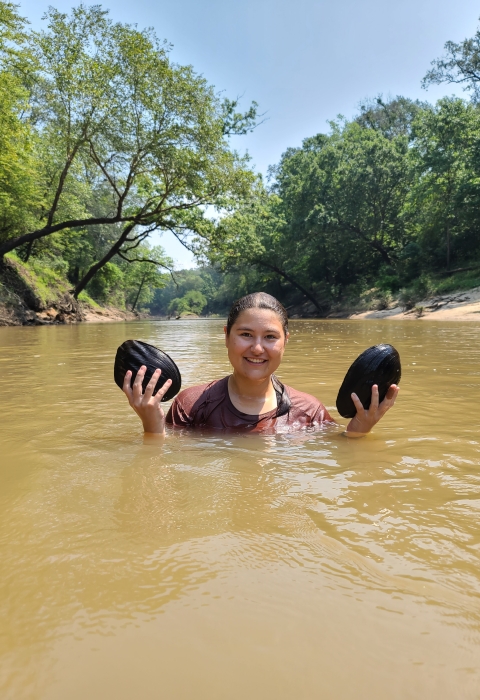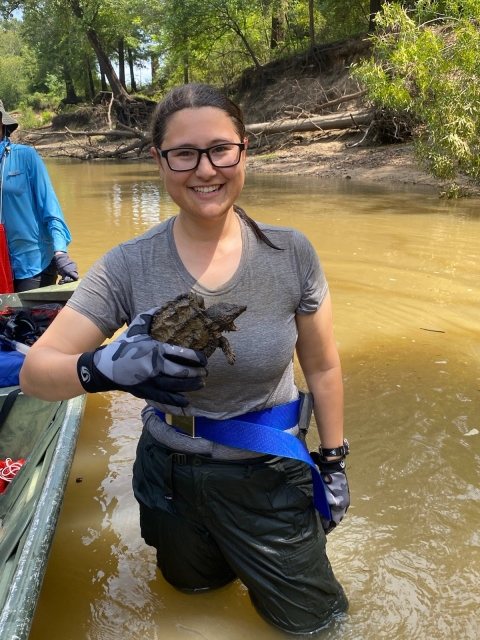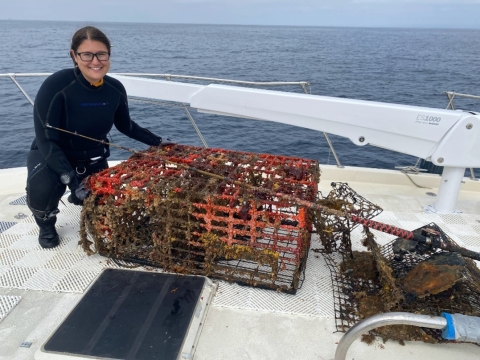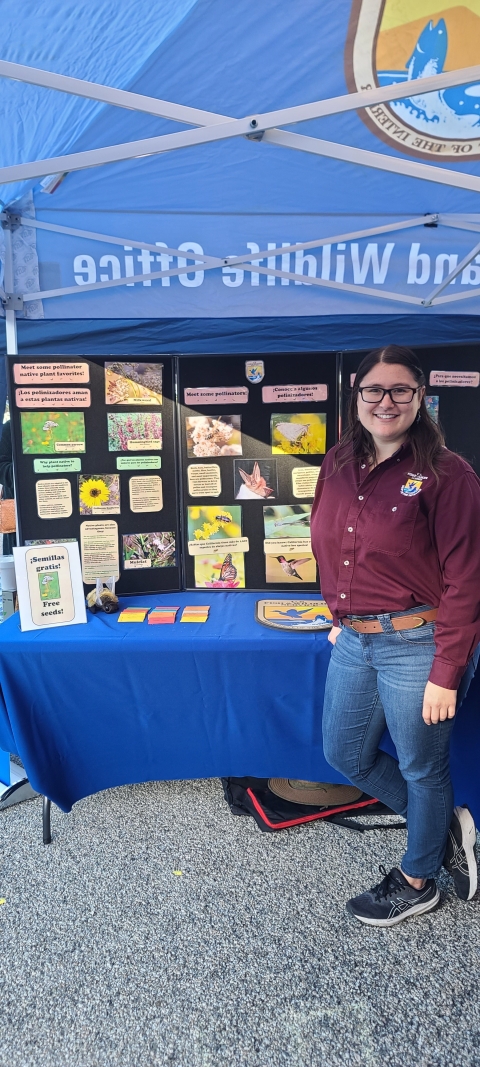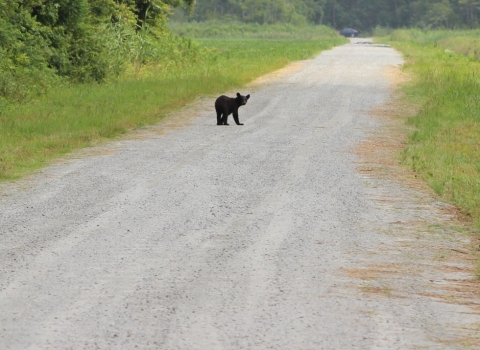Abigail Sanford is a fish and wildlife biologist at the Ventura Fish and Wildlife Office. Read on to learn about her journey to the Service, and her advice to prospective biologists and conservationists! She is interviewed by bilingual public affairs specialist, Vanessa Morales.
VM: Hey Abigail! It’s been a joy having you as part of the Ventura FWO team for these last few months! Can you describe what you do?
AS: I am a fish and wildlife biologist with the Ventura Fish and Wildlife Office Central Coast Division, and I largely help analyze impacts to threatened and endangered species. I am the species lead for the San Joaquin kit fox and the blunt-nosed leopard lizard.
VM: Did you always want to be a fish and wildlife biologist? How and when did you realize that you wanted to work for the U.S. Fish and Wildlife Service?
AS: It took me a while to figure out that I wanted to be a biologist. It was actually internships at the USFWS that were vital in helping me identify that I wanted to be a biologist and work at the Service.
When I was in undergrad at UC San Diego, I did an internship with the Carlsbad Fish and Wildlife Office working on conservation banks, which are lands protected in perpetuity to help offset the negative impacts to threatened and endangered species. While I was there, I had the opportunity to do informational interviews with many of the staff where I learned what it meant to work for the Service, what a career there would be like, and the great benefits that come with working with the government, such as job security. Lastly, the work they did for endangered and threatened species was fascinating, and I was inspired by working with so many people that cared and wanted to save them. After learning about their work and passion, I knew that was something worthwhile to dedicate my career to.
VM: That is an amazing way to figure out your path! What were you studying in undergrad at UC San Diego and what the trajectory after that?
AS: My major at UC San Diego was Environmental Systems: Ecology, Behavior, and Evolution. I graduated in the middle of the pandemic and unfortunately did not find any entry-level positions available. I decided to go back for graduate school so I could build up education and experience. I attended the Bren School of Environmental Science and Management at UC Santa Barbara where I specialized in Marine Resources Management with a focus in Environmental Communications.
VM: What made you want to pursue these environmental degrees originally?
AS: In high school, I knew I wanted to go to college, but had no idea what I wanted to study. When it came time to select a major, it was like staring at a blank wall hoping an answer would appear. So I spoke to one of my mentors at Scouts BSA (Boy Scouts of America). He gave me the advice to go into a major that would allow me to really explore and utilize my ‘jack-of-all-trades' skills. At the time, I knew that an environmental major could lead to a lot of different kinds of jobs like teaching, communications, and biology. So I chose it because I knew it would allow me to further explore what I really wanted to do rather than trying to figure it out while still in high school and not really having a lot of real-world experience yet.
VM: Absolutely. It is great advice to pick something that will open lots of doors. Is there a particular project from your schooling that you’re really proud of?
AS: I am really proud of my graduate school project where I co-led a team of five to analyze the economic and environmental impacts of lost California lobster fishing gear on the California lobster fishing community. As part of the project, I worked with a nonprofit called Ocean Defenders Alliance to help remove over 2000 pounds of fishing gear from the ocean. I got both analytical research experience and hands on experience while doing a lot of behind the scenes work to figure out how to reduce how much of that fishing gear is entering the ocean in the first place. It was a valuable experience to get a better understanding of how to address these really big impacts in an actionable and meaningful way. As part of that experience, I was trained in scientific research diving by the American Academy of Underwater Sciences! Sometimes I was in the middle of the channel going down 100 feet to pull out fishing gear!
VM: Wow! Thank you for doing that really important research! What would you recommend to others who aspire joining the U.S. Fish and Wildlife Service?
AS: I’d say if you can get into the Directorate Fellows Program (DFP), go for it! It is one of the best ways right now to land a permanent position at the Service and almost 100 internships are published each year, so there’s a higher chance of getting into that program compared to other similar internships. You must be a student to be eligible, so make sure you do it before you graduate!
VM: What did your DFP project consist of?
AS: I did mine during grad school with the Arlington, Texas Ecological Services field office and did work on two freshwater mussels—the Texas heelsplitter and the Louisiana pigtoe. Mussels have interesting names! These were two species that were proposed for listing on the endangered species list, so my job was to see if the water quality they were in was within survivable parameters. Specifically, I was looking at temperature and ammonia measurements. And as part of my DFP, I got to do something really cool which was a road trip throughout Texas visiting different fisheries, ecological service offices, and USFWS refuges while shadowing a different Service employee each day. Through that experience, I was able to get a strong idea of what each of those branches did and what the day-to-day work was like. I also did 5 full days of mussel surveys in the Sabine River, collecting over 1000 mussels, taking their measurements on length, and then tagging those that were species of concern with pit tags before releasing them into the wild.
VM: Sounds like you had an amazing experience with the DFP program that led you to the Service for a permanent position, which is fantastic. What are your interests outside of work?
AS: I really enjoy astronomy! I really like to go stargazing and depending on if I’m with friends, I’ll give star talks about where constellations are, how they can be used to navigate, and stories about them. I also love to go tide pooling and discover all the fun little creatures there! I also enjoy learning new skills. Right now, I am trying to work more on my nature photography, since I am not great at it yet, but I find it very rewarding!
VM: You have such a vast array of experiences and knowledge! We are so lucky to have you at the Ventura Fish and Wildlife Office. Thanks for chatting with me!
